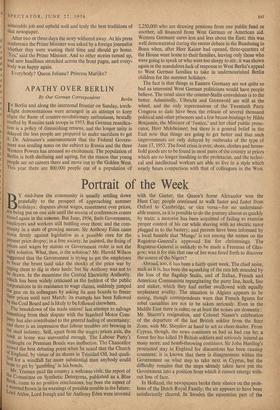APATHY OVER BERLIN
By Our German Correspondent Berlin
IN Berlin and along the interzonal frontier on Sunday, torch- light demonstrations were arranged in an attempt to keep alight the flame of counter-revolutionary enthusiasm, brutally snuffed by Russian tank troops in 1953. But German reunifica- tion is a policy of diminishing returns, and the longer unity is delayed the less people are prepared to make sacrifices to get 11. Dr. Adenauer's announcement that the Federal Govern- ment was sending notes on the subject to Russia and the three Western Powers has aroused no excitement. The population of Berlin is both declining and ageing, for the reason that young People see no careers there and move 'out to the Golden West. This year there are 800,000 people out of a population of 2,250,000 who are drawing pensions from one public fund or another, all financed from West German or American aid. Western Germany cares less and less about the East; this was well demonstrated during the recent debate in the Bundestag in Bonn when, after Herr Kaiser had opened, three-quarters of the House went home to their families, leaving only those who were going to speak or who were too sleepy to stir; it was shown again in the scandalous lack of response to West Berlin's appeal to West German families to take in undernourished Berlin children for the summer holidays.
The fact is that things in Eastern Germany are not quite so bad as interested West German politicians would have people believe. The trend since the counter-Stalin convulsions is to the better. Admittedly, Ulbricht and Grotewohl are still at the wheel, and the only repercussions of the Twentieth Party Congress to date have been the release of several thousand political and other prisoners and a few breast-beatings by Hilde Benjamin, the Minister of 'Justice,' and her chief public prose- cutor, Herr Melsheimer; but there is a general belief in the East now that things are going to get better and that such improvements are only delayed by outbreaks of the type of June 17, 1953. The food crisis is over, shoes, clothes and house- hold goods are to be found in most parts of the country at prices which are no longer insulting to the proletariat, and the techni- cal and intellectual workers are able to live in a style which nearly bears comparison with that of colleagues in the West.


































 Previous page
Previous page